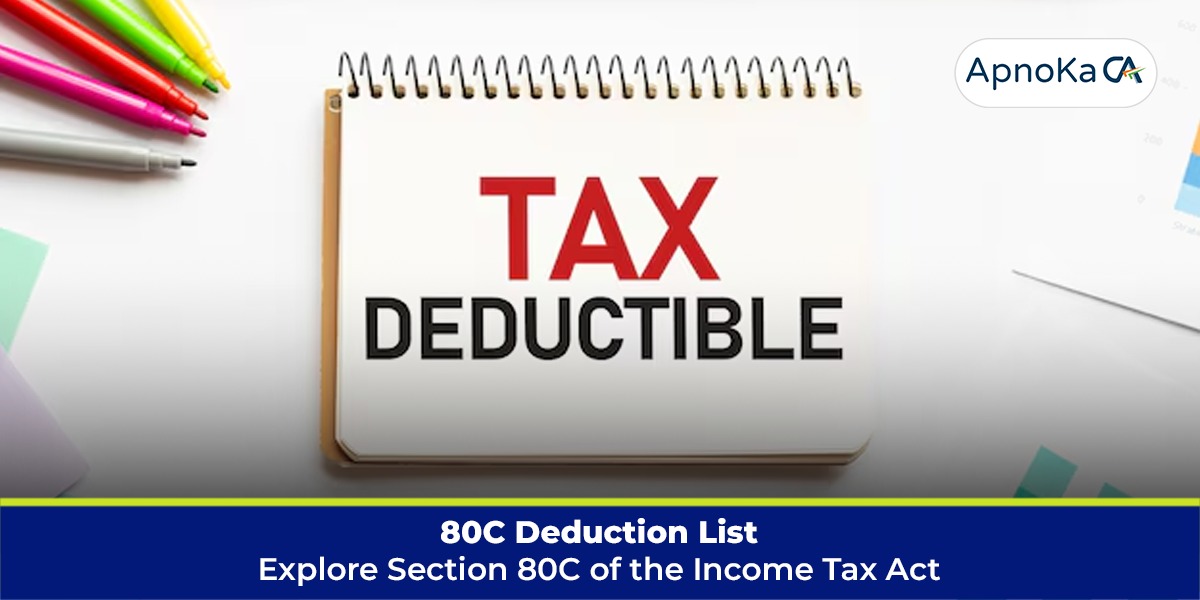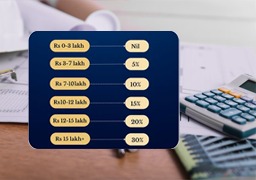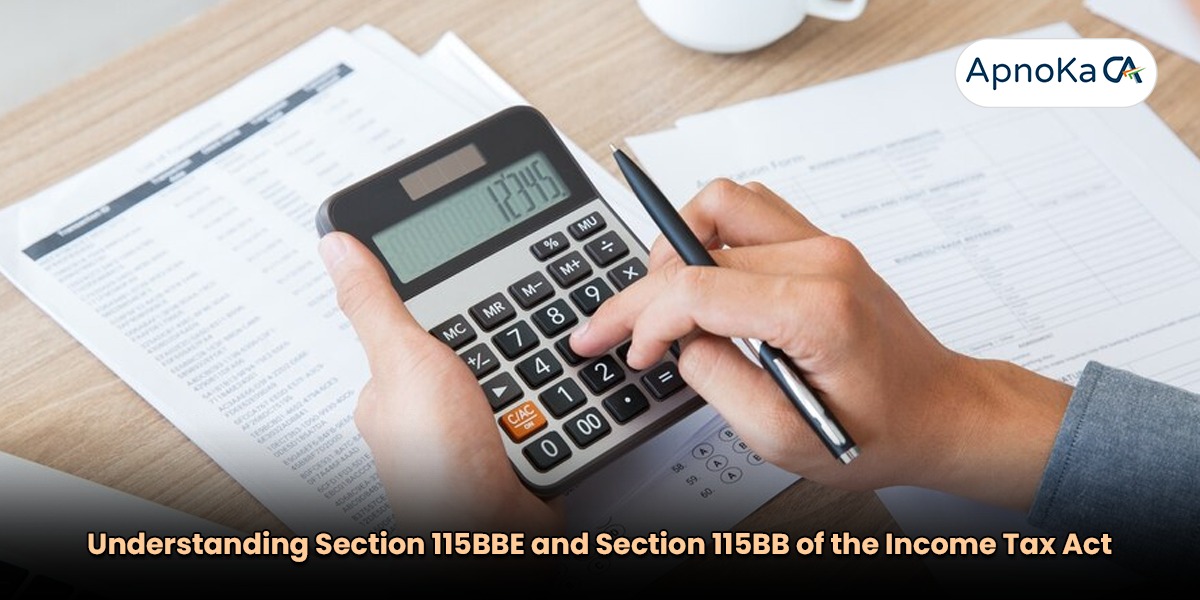Explore Section 80C: Comprehensive List of Tax Deductions
Discover how to maximize your tax savings with Section 80C of the Income Tax Act. This guide covers eligible investments like PPF, EPF, NSC, and tax-saving fixed deposits. Learn strategies to utilize the ₹1.5 lakh deduction limit, understand subsections 80CCC and 80CCD, and plan your finances for long-term benefits. Optimize your tax-saving strategies with this in-depth exploration of Section 80C deductions.

80C Deduction List - Explore Section 80C of the Income Tax Act
Section 80C of the Income Tax Act is one of the most popular sections among taxpayers in India, offering a range of deductions to help reduce taxable income. This section allows deductions on various investments and expenses, encouraging savings and investments among individuals and Hindu Undivided Families (HUFs). Let’s delve into the details of Section 80C, the eligible investments and expenses, and how you can maximize your tax benefits under this provision.
Introduction to Section 80C
Section 80C was introduced to incentivize savings and investments among taxpayers by providing tax deductions. It allows a maximum deduction of up to ₹1.5 lakh from the gross total income, thereby reducing the overall tax liability. The deductions under this section are applicable to individual taxpayers and HUFs but not to companies, LLPs, or partnership firms.
Eligible Investments and Expenses under Section 80C
Section 80C encompasses a wide range of investments and expenses. Here’s a comprehensive list of the eligible options:
1. Public Provident Fund (PPF)
- Contributions to PPF are eligible for deduction.
- The maximum investment limit is ₹1.5 lakh per annum.
- The interest earned and the maturity amount are tax-free.
2. Employee Provident Fund (EPF)
- Contributions made by employees towards EPF are eligible.
- The employer's contribution is also considered for the deduction limit.
3. National Savings Certificate (NSC)
- Investments in NSC are eligible for deduction.
- Interest earned is reinvested and qualifies for deduction in the subsequent years.
4. Tax-saving Fixed Deposits
- Fixed deposits with a tenure of 5 years in scheduled banks qualify.
- Interest earned is taxable.
5. Sukanya Samriddhi Yojana
- Investments in the Sukanya Samriddhi Yojana for a girl child are eligible.
- The interest earned and maturity amount are tax-free.
6. Senior Citizens Savings Scheme (SCSS)
- Contributions to SCSS are eligible for deduction.
- Interest earned is taxable.
7. Unit Linked Insurance Plan (ULIP)
- Premiums paid for ULIPs qualify for deduction.
- Provides life insurance coverage along with investment benefits.
8. Equity-Linked Savings Scheme (ELSS)
- Investments in ELSS mutual funds qualify.
- Comes with a lock-in period of 3 years and potential for high returns.
9. Life Insurance Premiums
- Premiums paid for life insurance policies for self, spouse, and children are eligible.
- Policies must comply with certain conditions to qualify.
10. Home Loan Principal Repayment
- Principal repayment of home loans qualifies for deduction.
- Also includes stamp duty and registration fees paid for the purchase of property.
11. Tuition Fees
- Tuition fees paid for up to two children’s education are eligible.
- Covers fees paid to any university, college, school, or other educational institution in India.
12. Infrastructure Bonds
- Investments in notified infrastructure bonds are eligible.
13. National Pension System (NPS)
- Contributions to NPS qualify for deduction under Section 80CCD(1), which is part of the overall Section 80C limit.
Additional Deductions under Section 80C
Apart from the primary deductions listed above, Section 80C also includes additional subsections that provide further tax benefits:
Section 80CCC
- Deductions for contributions to certain pension funds.
- Limited to ₹1.5 lakh per annum.
Section 80CCD
- Deductions for contributions to the National Pension System (NPS).
- Section 80CCD(1B) allows an additional deduction of ₹50,000 over and above the ₹1.5 lakh limit under Section 80C.
Maximizing Benefits under Section 80C
To fully utilize the benefits of Section 80C, consider the following strategies:
- Early Planning: Start planning your investments at the beginning of the financial year to avoid last-minute decisions and to ensure a diversified investment portfolio.
- Diversify Investments: Spread your investments across different eligible options such as PPF, ELSS, and life insurance to balance risk and returns.
- Long-term Focus: Opt for long-term investment options like PPF and ELSS to build a substantial corpus over time while enjoying tax benefits.
- Leverage Additional Deductions: Utilize additional deductions under Section 80CCD(1B) by contributing to NPS to maximize your tax savings.
- Review Regularly: Periodically review your investments to ensure they align with your financial goals and make adjustments as needed.
Conclusion
Section 80C of the Income Tax Act offers a robust framework for taxpayers to save on taxes while encouraging long-term savings and investments. By understanding the various eligible investments and expenses, and strategically planning your finances, you can make the most of the deductions available under this section. Ensure to stay informed about any changes in tax laws to continually optimize your tax-saving strategies.
Invest wisely and plan ahead to reap the full benefits of Section 80C, thereby securing your financial future while reducing your tax burden.
FILING YOUR INCOME TAX RETURN F.Y 2023-24 (A.Y. 2024-2025) WITH MYITRONLINE
Income tax filing deadline is right around the corner. If you haven’t filed yet, do it now for FREE on Myitronline! Avoid last minute rush and file your tax return today on MYITRONLINE in Just 5 mins.(www.myitronline.com)
If you are looking for eCA assistance to file your income tax return/ GST, you can opt for MYITRONLINE eCA assisted plan starting
Upload Salary Individual Form-16
If you have any questions with filing your tax return, please reply to this mail. info@myitronline.com OR call 9971055886,8130309886.
Note-All the aforementioned information in the article is taken from authentic resources and has been published after moderation. Any change in the information other than fact must be believed as a human error. For queries mail us at marketing@myitronline.com
Krishna Gopal Varshney
An editor at apnokacaKrishna Gopal Varshney, Founder & CEO of Myitronline Global Services Private Limited at Delhi. A dedicated and tireless Expert Service Provider for the clients seeking tax filing assistance and all other essential requirements associated with Business/Professional establishment. Connect to us and let us give the Best Support to make you a Success. Visit our website for latest Business News and IT Updates.
Leave a reply
Your email address will not be published. Required fields are marked *Share this article
Krishna Gopal Varshney, Founder & CEO of Myitronline Global Services Private Limited at Delhi. A dedicated and tireless Expert Service Provider for the clients seeking tax filing assistance and all other essential requirements associated with Business/Professional establishment. Connect to us and let us give the Best Support to make you a Success. Visit our website for latest Business News and IT Updates.
View articles














.jpg)
.jpg)






